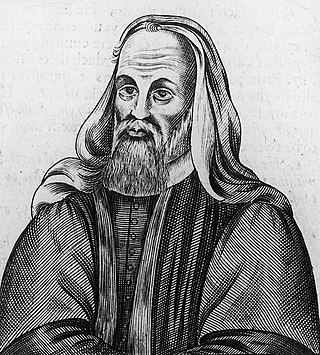The Ancient Christian Writers: The Works of the Fathers in Translation (abbreviated as ACW) is a book series with English translations of works by early Christian writers. The translations are made from Latin and Greek. [1] The series was founded by Johannes Quasten and Joseph C. Plumpe, the first volume being published in 1946.
The New Testament (NT) is the second division of the Christian biblical canon. It discusses the teachings and person of Jesus, as well as events relating to first-century Christianity. The New Testament's background, the first division of the Christian Bible, is called the Old Testament, which is based primarily upon the Hebrew Bible; together they are regarded as Sacred Scripture by Christians.

Origen of Alexandria, also known as Origen Adamantius, was an early Christian scholar, ascetic, and theologian who was born and spent the first half of his career in Alexandria. He was a prolific writer who wrote roughly 2,000 treatises in multiple branches of theology, including textual criticism, biblical exegesis and hermeneutics, homiletics, and spirituality. He was one of the most influential and controversial figures in early Christian theology, apologetics, and asceticism. He has been described as "the greatest genius the early church ever produced".

The Third Epistle of John is the third-to-last book of the New Testament and the Christian Bible as a whole, and attributed to John the Evangelist, traditionally thought to be the author of the Gospel of John and the other two epistles of John. The Third Epistle of John is a personal letter sent by "the elder" to a man named Gaius, recommending to him a group of Christians led by Demetrius, which had come to preach the gospel in the area where Gaius lived. The purpose of the letter is to encourage and strengthen Gaius, and to warn him against Diotrephes, who refuses to cooperate with the author of the letter.

Cyprian was a bishop of Carthage and an early Christian writer of Berber descent, many of whose Latin works are extant. He is recognized as a saint in the Western and Eastern churches.

Theodoret of Cyrus or Cyrrhus was an influential theologian of the School of Antioch, biblical commentator, and Christian bishop of Cyrrhus (423–457).

Hippolytus of Rome was a Bishop of Rome and one of the most important second–third centuries Christian theologians, whose provenance, identity and corpus remain elusive to scholars and historians. Suggested communities include Rome, Palestine, Egypt, Anatolia and other regions of the Middle East. The best historians of literature in the ancient church, including Eusebius of Caesarea and Jerome, openly confess they cannot name where Hippolytus the biblical commentator and theologian served in leadership. They had read his works but did not possess evidence of his community. Photios I of Constantinople describes him in his Bibliotheca as a disciple of Irenaeus, who was said to be a disciple of Polycarp, and from the context of this passage it is supposed that he suggested that Hippolytus so styled himself. This assertion is doubtful. One older theory asserts he came into conflict with the popes of his time and seems to have headed a schismatic group as a rival to the bishop of Rome, thus becoming an antipope. In this view, he opposed the Roman Popes who softened the penitential system to accommodate the large number of new pagan converts. However, he was reconciled to the Church before he died as a martyr.
Julius Firmicus Maternus was a Roman Latin writer and astrologer, who received a pagan classical education that made him conversant with Greek; he lived in the reign of Constantine I and his successors. His triple career made him a public advocate, an astrologer and finally a Christian apologist. The explicit, or end-tag, of the sole surviving manuscript of his De errore profanarum religionum gives his name as Iulius Firmicus Maternus V C, identifying him as a vir clarissimus and a member of the senatorial class. He was also author of the most extensive surviving text of Roman astrology, Matheseos libri octo written around 334–337. Manuscripts of this work identify him as "the younger" (iunior) or "the Sicilian" (Siculus). The lunar crater Firmicus was named in his honour.

Pelagius was a British theologian known for promoting a system of doctrines which emphasized human choice in salvation and denied original sin. Pelagius was accused of heresy at the synod of Jerusalem in 415 and his doctrines were harshly criticized by Augustine of Hippo, especially the Pelagian views about mankind's good nature and individual responsibility for choosing asceticism. Pelagius especially stressed the freedom of human will. Very little is known about the personal life and career of Pelagius.
Premillennialism, in Christian eschatology, is the belief that Jesus will physically return to the Earth before the Millennium, heralding a literal thousand-year messianic age of peace. Premillennialism is based upon a literal interpretation of Revelation 20:1–6 in the New Testament, which describes Jesus's reign in a period of a thousand years.

The Johannine Comma is an interpolated phrase (comma) in verses 5:7–8 of the First Epistle of John.

The authorship of the Johannine works has been debated by biblical scholars since at least the 2nd century AD. The debate focuses mainly on the identity of the author(s), as well as the date and location of authorship of these writings.

The pastoral epistles are a group of three books of the canonical New Testament: the First Epistle to Timothy, the Second Epistle to Timothy, and the Epistle to Titus. They are presented as letters from Paul the Apostle to Timothy and to Titus. However, many scholars believe they were written after Paul's death. They are generally discussed as a group and are given the title pastoral because they are addressed to individuals with pastoral oversight of churches and discuss issues of Christian living, doctrine and leadership. The term "pastorals" was popularized in 1703 by D. N. Berdot and in 1726 by Paul Anton. Alternate nomenclature for the cluster of three letters has been proposed: "Corpus Pastorale," meant to highlight the intentional forgery of the letters as a three-part corpus, and "Letters to Timothy and Titus," meant to emphasize the individuality of the letters.
Firmilian, Bishop of Caesarea Mazaca from c. 232, was a disciple of Origen. He had a contemporary reputation comparable to that of Dionysius of Alexandria or Cyprian, bishop of Carthage. He took an active part in the mid-3rd century controversies over rebaptising heretics and readmitting lapsed Christians after the persecutions of Decius and was excommunicated by Pope Stephen I for his position. A single letter of Firmilian to Cyprian survives among Cyprian's correspondence. Jerome omits Firmilian from De viris illustribus. "To his contemporaries his forty years of influential episcopate, his friendship with Origen and Dionysius, the appeal to him of Cyprian, and his censure of Stephanus might well make him seem the most conspicuous figure of his time" (Wace).

De Viris Illustribus is a collection of short biographies of 135 authors, written in Latin, by the 4th-century Latin Church Father Jerome. He completed this work at Bethlehem in 392–393 AD. The work consists of a prologue plus 135 chapters, each consisting of a brief biography. Jerome himself is the subject of the final chapter. A Greek version of the book, possibly by the same Sophronius who is the subject of Chapter 134, also survives. Many biographies take as their subject figures important in Christian Church history and pay especial attention to their careers as writers. It "was written as an apologetic work to prove that the Church had produced learned men." The book was dedicated to Flavius Lucius Dexter, who served as high chamberlain to Theodosius I and as praetorian prefect to Honorius. Dexter was the son of Saint Pacianus, who is eulogized in the work.

Christianity in the ante-Nicene period was the time in Christian history up to the First Council of Nicaea. This article covers the period following the Apostolic Age of the first century, c. 100 AD, to Nicaea in 325 AD.
The canon of the New Testament is the set of books many modern Christians regard as divinely inspired and constituting the New Testament of the Christian Bible. For most churches, the canon is an agreed-upon list of 27 books that includes the canonical Gospels, Acts, letters attributed to various apostles, and Revelation.

The Church Fathers, Early Church Fathers, Christian Fathers, or Fathers of the Church were ancient and influential Christian theologians and writers who established the intellectual and doctrinal foundations of Christianity. The historical period in which they worked became known as the Patristic Era and spans approximately from the late 1st to mid-8th centuries, flourishing in particular during the 4th and 5th centuries, when Christianity was in the process of establishing itself as the state church of the Roman Empire.

The term "Great Church" is used in the historiography of early Christianity to mean the period of about 180 to 313, between that of primitive Christianity and that of the legalization of the Christian religion in the Roman Empire, corresponding closely to what is called the Ante-Nicene Period. "It has rightly been called the period of the Great Church, in view of its numerical growth, its constitutional development and its intense theological activity."
The Popular Patristics Series is a series of volumes of original English translations of mainly first millennium Christian texts published by St. Vladimir's Seminary Press.